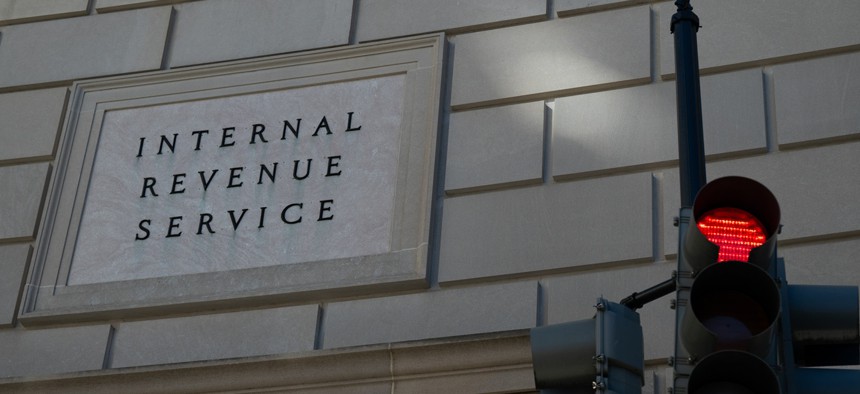
A Republican proposal would appropriate $15 million in fiscal 2026 for a task force “to design a better public-private partnership between the IRS and private sector tax preparation services to provide for free tax filing to replace the existing ‘Free File’ program and any ‘direct efile’ tax return system.” Annabelle Gordon / The Washington Post / Getty Images
Republicans want Treasury to study free tax filing options — again
The reconciliation text being considered by the House Ways and Means Committee includes $15 million for the IRS to study how to give Americans free ways to file their taxes that would replace both the Free File and Direct File programs.
A provision tucked inside Republicans’ reconciliation text would officially end IRS Direct File — a Biden-era free tax filing website the Trump administration is reportedly planning to shutter already — and establish a task force to replace it and Free File, the public-private program the IRS has long used to offer most taxpayers a free way to file online.
The House Ways and Means Committee is marking up the text Tuesday as part of Republicans’ effort to pass immigration, tax and benefit policy priorities through one “big beautiful bill.”
The proposal is the latest attempt from Republicans to kill Direct File, which the Trump administration already plans to eliminate, the Associated Press reported in April. The Biden administration launched Direct File in 2024, where it got high marks from users in that inaugural tax season, and the IRS expanded it from 12 to 25 states this year.
What’s new, under the Republican proposal, is the closer look at Free File, a public-private partnership the government has used for decades to give most Americans a free option to file their taxes online. For a long time, the arrangement included a provision that the government wouldn't develop its own solution, thus competing with tax prep companies, although that clause was removed in 2019.
The bill would appropriate $15 million in fiscal 2026 for a task force “to design a better public-private partnership between the IRS and private sector tax preparation services to provide for free tax filing to replace the existing ‘Free File’ program and any ‘direct efile’ tax return system.”
Democrats had a provision for a similar study on the feasibility and cost of Direct File in their own 2022 reconciliation package.
The new task force would be asked to deliver a report on the cost of a new public-private partnership to offer free tax filing for most taxpayers; taxpayer opinions on such a system and a government-run system; and the feasibility of a new approach.
The IRS has offered Free File since 2003, but only a sliver of eligible taxpayers have used it — about 3% in recent years, per a 2024 report from Treasury’s watchdog. And some tax prep companies have pressed people toward paying for products even when they could use free ones.
Intuit entered a settlement in 2022 for pushing Americans to paid products even when they were eligible for free ones. H&R Block agreed to a $7 million settlement with the Federal Trade Commission late last year for what the FTC said were deceptive promises of free filing services.
Neither are part of Free File anymore, a fact that raised questions for the Government Accountability Office about the long-term viability of the program.
The Taxpayer Advocate Service — an independent organization within the IRS that advises the agency on taxpayer issues — recommended that the IRS offer its own system in 2023.
“Most U.S. adults are legally required to file federal income tax returns,” National Taxpayer Advocate Erin Collins wrote at the time. “Taxpayers have a right to expect that this process will be as easy and straightforward as possible, and the IRS has an interest in facilitating it, because the U.S. tax system relies on self-assessment and voluntary compliance for the collection of revenue.
Since its launch, Direct File has been heralded by many in the civic technology space as an example of how the government can do technology well, even as it faced challenges with drop off rates and low participation. Last year, the Direct File pilot saved Americans $5.6 million in tax prep fees on their federal returns, according to the IRS.
Tax prep companies, meanwhile, have increased their lobbying efforts, as Open Secrets has reported. Those against Direct File have pointed to its cost, called it redundant and argued that Congress never authorized it. Nearly 30 House Republicans called the program “a threat to taxpayers’ freedom from government overreach” late last year.
If you have a tip you'd like to share, Natalie Alms can be securely contacted at nalms.41 on Signal.
NEXT STORY: Trump’s Qatari Air Force One would pose massive security risks







